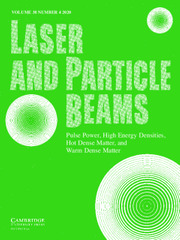Article contents
Effect of electron-ion recombination on self-focusing/defocusing of a laser pulse in tunnel ionized plasmas
Published online by Cambridge University Press: 29 October 2013
Abstract
A formalism for investigation of the propagation characteristics of various order short duration (pico second) Gaussian/dark hollow Gaussian laser pulse (DHGP) in a tunnel ionized plasma has been developed, which takes into account the electron-ion recombination. Utilizing the paraxial like approach, a nonlinear Schrödinger wave equation characterizing the beam spot size in space and time has been derived and solved numerically to investigate the transverse focusing (in space) and longitudinal compression (in time) of the laser pulse; the associated energy localization as the pulse advances in the plasma has also been analyzed. It is seen that in the absence of recombination the DHGP and Gaussian pulse undergo oscillatory and steady defocusing respectively. With the inclusion of recombination, the DHGP and Gaussian pulse both undergo periodic self-focusing for specific parameters. The DHGPs promise to be suitable for enhancement of energy transport inside the plasma.
- Type
- Research Article
- Information
- Copyright
- Copyright © Cambridge University Press 2013
References
REFERENCES
- 9
- Cited by


